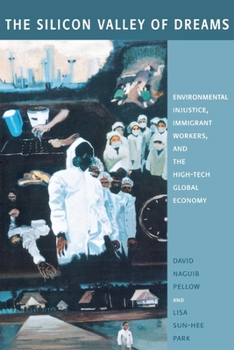The Silicon Valley of Dreams: Environmental Injustice, Immigrant Workers, and the High-Tech Global Economy
Select Format
Select Condition 
Book Overview
Examines the environmental racism at the foundation of the Silicon Valley economy
Format:Paperback
Language:English
ISBN:0814767109
ISBN13:9780814767108
Release Date:December 2002
Publisher:New York University Press
Length:303 Pages
Weight:1.01 lbs.
Dimensions:0.8" x 6.6" x 8.5"
Customer Reviews
1 rating
Groundbreaking
Published by Thriftbooks.com User , 19 years ago
"The Silicon Valley of Dreams" by David Pellow and Lisa Sun-Hee Park is a groundbreaking book that connects the environmental justice (EJ) movement with struggles pertaining to immigration, gender, workplace, and globalization. The authors present a new historiography of Santa Clara County, California that reveals a pattern of exploitation of people and resources dating from the Spanish Colonial period to the present. The book makes a compelling case that sustainability will remain elusive as long as for-profit capitalism rules the day. Pellow and Park study the area's historical development to find common threads between the past and the present. Each economic period was marked by the despoilation and depletion of California's natural resources, and in all cases, the production system was characterized by the exploitation of predominantly poor, immigrant and female labor. Interestingly, the authors show how the powerful have been consistently supported by their government sponsors even as the rights of the poor have been systematically denied. We find that the Spanish government's funding of the missionaries was not substantially different from the U.S. government's support of the California gold mining industry of the 1800s, the canneries of the early to mid twentieth century or the highly lucrative defense industry of today. Yet the indigenuous peoples and the poor immigrant workers who have labored in the fields and the factories have been consistently denied their political and economic rights. In this light, the fact that the poor suffer disproportionately from environmental injustices should not be surprising, or that the struggle to overcome the powerful interests that profit from the system remains difficult. The authors show how the electronics manufacturing that dominates Silicon Valley today is not the "clean" industry that is often promoted by corporate public relations firms. We learn how the so-called "immaterial" economy is in fact produced with enormous amounts of energy inputs and demanding physical labor. Management's criminal silence on issues pertaining to workplace safety and the pollution of the local environment clashes severely with the industry's oft-repeated hyperbole about the open and empowered society that is purportedly fostered through information technology. The author's analysis is supported with moving testimonies from flesh-and-blood workers who have suffered the ill effects of toxic exposure. Their heart-wrenching stories bring home the human costs of our high-tech culture in a deeply compelling way. But the authors also relate how grass-roots organizations have won modest victories in their attempts to protect workers and the community from harm. Clearly, the empowerment of women and minorities and respect for the environment is critical to achieving a sustainable and egalitarian society. I recommend this highly readable, insightful and important book to everyone.





